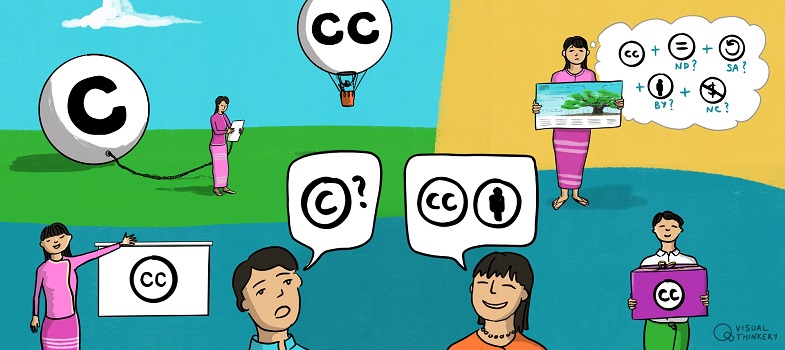Reasons to use OER and CC-licensed resources
As we saw in the last section, not all CC-licensed materials give permission for you to make changes to them. However, resources with the ND or no-derivatives element do enable sharing and copying of the resource – sometimes even for commercial purposes. Even though you cannot make changes to ND-licensed material, they may be useful for reference or as a supporting resource at your university. In the next section we’ll look in more detail about what you should consider when you’re looking for openly licensed resources, and where to find them.
Let’s take a closer look at some of the other reasons why we might want to use CC-licensed material and OER:
- Resources with open licences have clear instructions on what you can and can’t do with them.
- It is easier to use CC-licensed materials as you don’t have to seek permission and/or pay a fee to the copyright holder. This can save time and money.
- Some resources with more permissive CC licences – those that enable changes to be made to the resource, for example – can be adapted to better suit the context they will be used in. This is often referred to as ‘localisation’. Localising existing resources can save time as you don’t need to start afresh to create new material.
- Many openly licensed resources are in English. Although more OER in different languages and reflecting different contexts is needed, within the Myanmar university context this means that there are many existing resources that could be considered for use. Many of these resources could also be translated, if permitted by the licence type.
- Incorporating different OER into teaching and learning materials can provide different perspectives or ways of explaining concepts to students.
- Openly licensed resources increase access to educational material by providing resources to everyone, not only those who can afford to buy particular books. You could curate collections of OER to build stock in the library or to support existing courses.
- Finally, the idea of OER is strongly advocated around the world by a broad range of individuals, organisations, and governments, as evidenced by documents like the Cape Town Open Education Declaration (2007), the UNESCO Paris OER Declaration (2012), and the UNESCO Ljubljana OER Action Plan (2017) and the UNESCO OER Recommendation (2019).
Reflection
Do these reasons for using openly licensed material resonate with you? Can you think of other reasons to add to the list? What reasons might resonate best with colleagues or students?
Introduction
